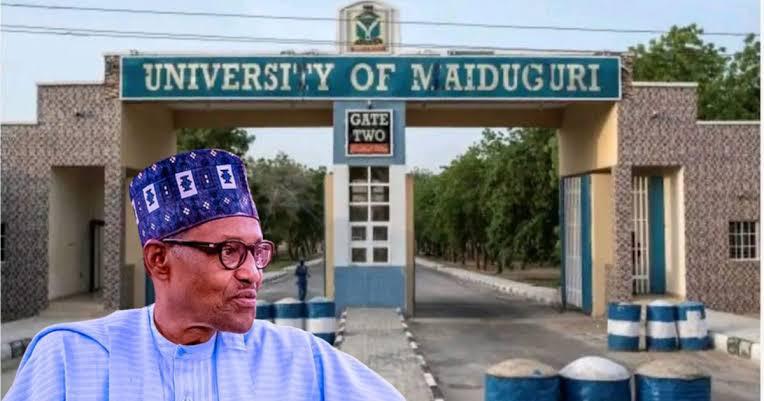On July 16, 2025, President Bola Tinubu announced the renaming of the University of Maiduguri to Muhammadu Buhari University, Maiduguri, in tribute to the late former President Muhammadu Buhari, who passed away on July 13, 2025. Unveiled during a Federal Executive Council session in Abuja, the decision was framed as a celebration of Buhari’s legacy of discipline and patriotism.
Yet, in a nation as diverse and polarized as Nigeria, this move has ignited a complex debate, not only about Buhari’s tenure but also about the enduring wounds of events like the #EndSARS protests and the cash scarcity crisis that marked his presidency. As we weigh this symbolic gesture, we must ask whether it unifies the nation or reopens old scars.
The University of Maiduguri, established in 1975, stands as a beacon of academic resilience in Nigeria’s Northeast, a region battered by insurgency yet steadfast in its pursuit of knowledge. Naming it after Muhammadu Buhari, a leader whose presidency from 2015 to 2023 was both lauded and lambasted, is a decision laden with historical and emotional weight.
President Tinubu’s praise for Buhari’s discipline and patriotism implied a legacy that includes significant strides in combating Boko Haram, advancing infrastructure, and tackling corruption. However, the renaming also evokes memories of turbulent moments—most notably the #EndSARS protests of 2020 and the cash scarcity crisis of 2022-2023—that continue to shape public perception of Buhari’s era.
The #EndSARS movement, initially a youth-led outcry against police brutality, morphed into a nationwide reckoning with governance failures. The protests, which peaked in October 2020, were met with a heavy-handed response, culminating in the tragic Lekki Toll Gate shooting, where lives were lost and trust in the state fractured. The aftermath saw widespread looting and destruction of public and private property in cities like Lagos, Abuja, and Benin, as frustration boiled over into chaos.
For many Nigerians, particularly the youth, the #EndSARS saga remains a symbol of unaddressed grievances—grievances tied to Buhari’s administration, which was seen as slow to respond to the protesters’ demands and complicit in the crackdown. Renaming a federal institution after Buhari risks being perceived as tone-deaf to these unresolved traumas, particularly among those who view the protests as a defining moment of their disenfranchisement.
Similarly, the cash scarcity crisis of late 2022 and early 2023, triggered by the Central Bank of Nigeria’s naira redesign policy under Buhari’s watch, left an indelible mark on the nation’s psyche. The policy, intended to curb vote-buying and promote a cashless economy, instead unleashed economic chaos. Nigerians queued for hours at banks and ATMs, unable to access their funds, while small businesses collapsed and livelihoods suffered.
The scarcity fueled public outrage, with protests and riots erupting in cities like Ibadan and Port Harcourt. Critics argue that the policy’s poor implementation reflected a disconnect between Buhari’s administration and the everyday struggles of Nigerians. For many, this episode epitomized a presidency that, despite its intentions, often failed to anticipate the human cost of its decisions.
Supporters of Buhari, however, see a different narrative. They argue that his efforts to stabilize the Northeast, where the University of Maiduguri is located, deserve recognition. His administration’s military campaigns weakened Boko Haram, restoring a semblance of normalcy to parts of Borno State.
His anti-corruption drive, though imperfect, and investments in infrastructure, such as the Second Niger Bridge and rail networks, are cited as enduring achievements. To these Nigerians, naming the university after Buhari is a fitting honor for a leader who prioritized national security and development, even in the face of daunting challenges.
Yet, the decision to rename a national institution like the University of Maiduguri cannot be divorced from the broader context of Buhari’s legacy. His presidency was a period of deep division, marked by economic recessions, rising insecurity, and accusations of regional favoritism.
The #EndSARS protests and cash scarcity crisis, in particular, remain raw wounds for millions, symbolizing a governance style that often seemed distant from the people it served. Renaming a university in a region that endured both the brunt of insurgency and the fallout of national policies risks alienating those who associate Buhari’s name with hardship rather than heroism.
Nigeria’s history of naming institutions offers lessons in balancing legacy with unity. The University of Nigeria, Nsukka, embodies a collective national identity, while Ahmadu Bello University honors a regional icon without alienating others. A more nuanced approach—perhaps dedicating a faculty, research center, or scholarship fund to Buhari—might have honored his contributions while preserving the university’s universal appeal.
Moreover, the timing of the announcement, mere days after Buhari’s passing, raises questions about the depth of consultation. In a nation where trust in institutions is fragile, such decisions demand transparency and inclusivity to avoid perceptions of political expediency.
As Nigeria grapples with pressing challenges—floods in the North, economic strain from rising energy costs, and persistent insecurity—the government must prioritize actions that foster unity over gestures that risk division. The #EndSARS protests and cash scarcity crisis are not distant memories; they are lived experiences that shape how Nigerians view their leaders.
Honoring Buhari’s legacy should not come at the cost of ignoring these realities. A public consultation process, engaging academics, students, and communities across Nigeria’s diverse regions, could have ensured that the renaming reflects a shared vision rather than a unilateral decree.
Ultimately, the measure of Buhari’s legacy—and of this renaming—lies not in plaques or titles but in how Nigeria heals and progresses. The University of Maiduguri, as a symbol of resilience, should inspire a future where every Nigerian feels heard and valued.
As we honor our past, let us commit to a present that addresses the pains of #EndSARS, the lessons of the cash scarcity crisis, and the aspirations of a united nation. Only then can we ensure that our tributes build bridges rather than barriers.



